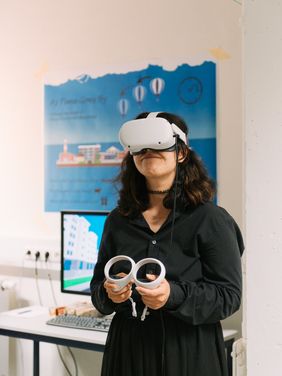
»VR Ready for You«: Computer Science Students to Receive Their Own VR Headset Upon Starting Their Studies
The Faculty of Media at the Bauhaus-Universität Weimar is welcoming first-year Computer Science students with something special in the 2025/2026 winter semester: Their own VR headsets. The Meta Quest 3 headset can be used flexibly throughout the degree programme in courses, group projects, individual research, or experiments at home. The »VR Ready for You« campaign aims to familiarise students with the latest computer science research ad to actively prepare them for working with current and future technologies.
Through this campaign, the Computer Science of Media Department is hoping to highlight the role of immersive technologies in teaching and to create opportunities for independent creative use. »Virtual reality isn’t a vision of the future for us — it’s a daily reality in our degree programme«, explains Prof. Dr. Bernd Fröhlich, Director of the Professorship of Virtual Reality and Visualisation. »We want our students to have access to the latest technology from day one, not only in our labs, but also in their own homes. They’re studying here in Weimar at a top-notch location for research and teaching in the cutting edge subjects of computer science.«
Equipping students with their own VR headsets isn't just a symbolic act, it will also have practical impact on their everyday lives: The headsets offer immediate access to future technologies, encourage independent experimentation, and open up new forms of learning and research for all students in the Computer Science programme. »It reinforces the programme's claim«, says Fröhlich, »to consistently combine theory and practice and to particularly encourage students’ own initiatives.«
Planning for a VR club is also underway where students will learn the basics of extended reality systems, receive individual coaching, and develop their own projects. The club is meant to provide a space for exchange, creative ideas, and individual specialisations.
About the Bachelor’s Degree Programme in Computer Science
The Bachelor degree programme in Computer Science at the Faculty of Media combines scientifically based teaching in computer science and mathematics with current topics such as artificial intelligence, IT security, data science, and visual computing. In intensive, practice-orientated project modules, students work in small teams and develop sophisticated systems that combine various disciplines. An example of this is creating small VR games where players meet AI agents. The games guarantee secure data transmission between the players and allow intuitive interactions between the avatars.
The curriculum is supplemented by the option to specialise individually through elective modules: Students can select from numerous courses offered by the Faculty of Media, as well as those offered by other faculties at the university. The aim is to enable students to independently design, implement, and evaluate complex systems, while recognising current challenges and their social implications.
Those interested can apply for the 2025/2026 winter semester here: https://www.uni-weimar.de/de/medien/studium/informatik-bsc/bewerbung/
»VR Ready for You«: Computer Science Students to Receive Their Own VR Headset Upon Starting Their Studies
The Faculty of Media at the Bauhaus-Universität Weimar is welcoming first-year Computer Science students with something special in the 2025/2026 winter semester: Their own VR headsets. The Meta Quest 3 headset can be used flexibly throughout the degree programme in courses, group projects, individual research, or experiments at home. The »VR Ready for You« campaign aims to familiarise students with the latest computer science research ad to actively prepare them for working with current and future technologies.
Through this campaign, the Computer Science of Media Department is hoping to highlight the role of immersive technologies in teaching and to create opportunities for independent creative use. »Virtual reality isn’t a vision of the future for us — it’s a daily reality in our degree programme«, explains Prof. Dr. Bernd Fröhlich, Director of the Professorship of Virtual Reality and Visualisation. »We want our students to have access to the latest technology from day one, not only in our labs, but also in their own homes. They’re studying here in Weimar at a top-notch location for research and teaching in the cutting edge subjects of computer science.«
Equipping students with their own VR headsets isn't just a symbolic act, it will also have practical impact on their everyday lives: The headsets offer immediate access to future technologies, encourage independent experimentation, and open up new forms of learning and research for all students in the Computer Science programme. »It reinforces the programme's claim«, says Fröhlich, »to consistently combine theory and practice and to particularly encourage students’ own initiatives.«
Planning for a VR club is also underway where students will learn the basics of extended reality systems, receive individual coaching, and develop their own projects. The club is meant to provide a space for exchange, creative ideas, and individual specialisations.
About the Bachelor’s Degree Programme in Computer Science
The Bachelor degree programme in Computer Science at the Faculty of Media combines scientifically based teaching in computer science and mathematics with current topics such as artificial intelligence, IT security, data science, and visual computing. In intensive, practice-orientated project modules, students work in small teams and develop sophisticated systems that combine various disciplines. An example of this is creating small VR games where players meet AI agents. The games guarantee secure data transmission between the players and allow intuitive interactions between the avatars.
The curriculum is supplemented by the option to specialise individually through elective modules: Students can select from numerous courses offered by the Faculty of Media, as well as those offered by other faculties at the university. The aim is to enable students to independently design, implement, and evaluate complex systems, while recognising current challenges and their social implications.
Those interested can apply for the 2025/2026 winter semester here: https://www.uni-weimar.de/de/medien/studium/informatik-bsc/bewerbung/
Kontakt
Bauhaus-Universität Weimar
Claudia Weinreich
Pressesprecherin
Tel.: +49(0)3643/58 11 73
Luise Ziegler
Mitarbeiterin Medienarbeit
Tel.: +49(0)3643/58 11 80
Fax: +49(0)3643/58 11 72
E-Mail: presse[at]uni-weimar.de
Web: www.uni-weimar.de/medienservice
